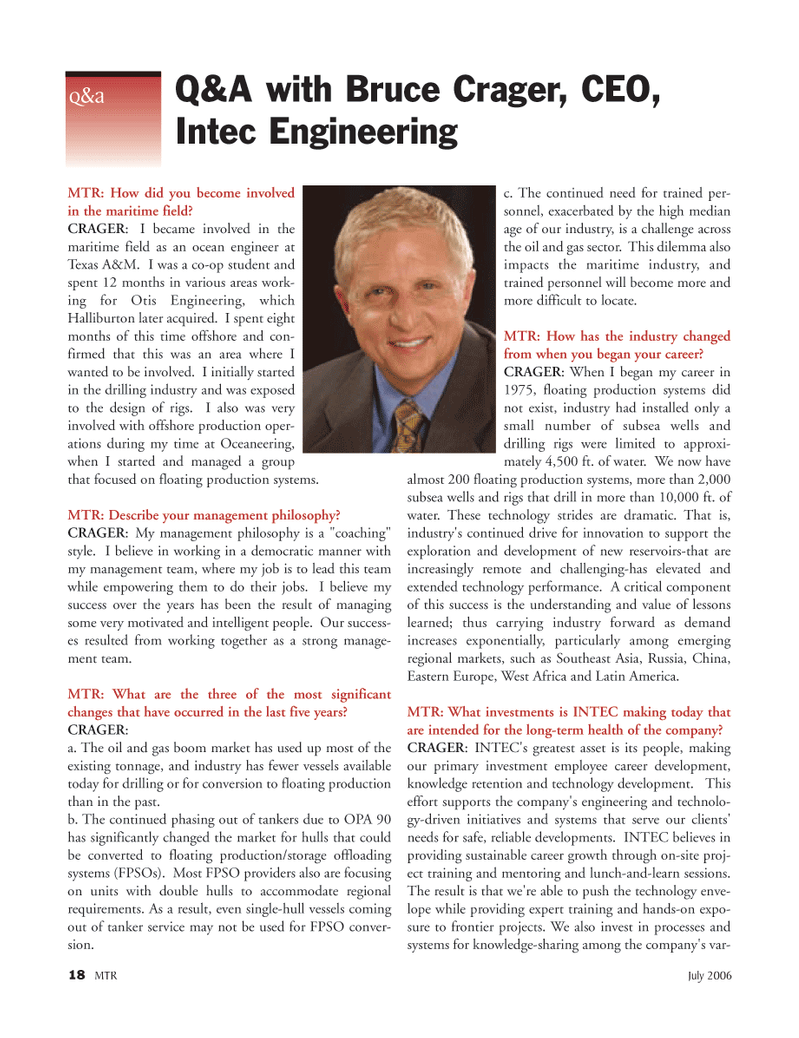
Page 18: of Marine Technology Magazine (July 2006)
Underwater Defense: Port & Harbor Security
Read this page in Pdf, Flash or Html5 edition of July 2006 Marine Technology Magazine
18 MTR July 2006 q&a
MTR: How did you become involved in the maritime field?
CRAGER: I became involved in the maritime field as an ocean engineer at
Texas A&M. I was a co-op student and spent 12 months in various areas work- ing for Otis Engineering, which
Halliburton later acquired. I spent eight months of this time offshore and con- firmed that this was an area where I wanted to be involved. I initially started in the drilling industry and was exposed to the design of rigs. I also was very involved with offshore production oper- ations during my time at Oceaneering, when I started and managed a group that focused on floating production systems.
MTR: Describe your management philosophy?
CRAGER: My management philosophy is a "coaching" style. I believe in working in a democratic manner with my management team, where my job is to lead this team while empowering them to do their jobs. I believe my success over the years has been the result of managing some very motivated and intelligent people. Our success- es resulted from working together as a strong manage- ment team.
MTR: What are the three of the most significant changes that have occurred in the last five years?
CRAGER: a. The oil and gas boom market has used up most of the existing tonnage, and industry has fewer vessels available today for drilling or for conversion to floating production than in the past. b. The continued phasing out of tankers due to OPA 90 has significantly changed the market for hulls that could be converted to floating production/storage offloading systems (FPSOs). Most FPSO providers also are focusing on units with double hulls to accommodate regional requirements. As a result, even single-hull vessels coming out of tanker service may not be used for FPSO conver- sion. c. The continued need for trained per- sonnel, exacerbated by the high median age of our industry, is a challenge across the oil and gas sector. This dilemma also impacts the maritime industry, and trained personnel will become more and more difficult to locate.
MTR: How has the industry changed from when you began your career?
CRAGER: When I began my career in 1975, floating production systems did not exist, industry had installed only a small number of subsea wells and drilling rigs were limited to approxi- mately 4,500 ft. of water. We now have almost 200 floating production systems, more than 2,000 subsea wells and rigs that drill in more than 10,000 ft. of water. These technology strides are dramatic. That is, industry's continued drive for innovation to support the exploration and development of new reservoirs-that are increasingly remote and challenging-has elevated and extended technology performance. A critical component of this success is the understanding and value of lessons learned; thus carrying industry forward as demand increases exponentially, particularly among emerging regional markets, such as Southeast Asia, Russia, China,
Eastern Europe, West Africa and Latin America.
MTR: What investments is INTEC making today that are intended for the long-term health of the company?
CRAGER: INTEC's greatest asset is its people, making our primary investment employee career development, knowledge retention and technology development. This effort supports the company's engineering and technolo- gy-driven initiatives and systems that serve our clients' needs for safe, reliable developments. INTEC believes in providing sustainable career growth through on-site proj- ect training and mentoring and lunch-and-learn sessions.
The result is that we're able to push the technology enve- lope while providing expert training and hands-on expo- sure to frontier projects. We also invest in processes and systems for knowledge-sharing among the company's var-
Q&A with Bruce Crager, CEO,
Intec Engineering
MTR#6 (17-32).qxd 7/11/2006 8:46 AM Page 18

 17
17

 19
19
